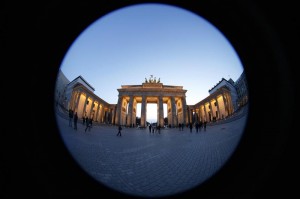
Today marks the 65th anniversary of the end of World War Two. No big deal, you might say. And on the GERMANY/surface there is certainly nothing all that extraordinary about May 7, 2010. There has been none of the celebrating that marked the 40th or 50th or even 60th anniversaries.
But what is interesting about this 65th anniversary of the end of the fighting in Europe is that it means every German (and Austrian) born before the war’s end has now reached retirement age. In other words, the entire war-era generation – even those who were infants on V-E Day – is now in retirement. It means all those running Germany now – in government or management, or running factories or driving busses – had, as documented by their birth certificates, nothing whatsoever to do with World War Two.
Their parents, grandparents or great grandparents who might have voted for Adolf Hitler in the last free elections in 1933 could still be held accountable, even indirectly, for the war, the Holocaust and Nazi crimes.
But can Germans born after the war still be blamed for it? Should those born decades or even a half century later still be made to feel the burden of guilt? I think not – and that is why I have, subconsciously, looked forward to dates like May 7, 2010 for nearly 30 years.
As a young American exchange student new to West Germany in 1982, I was struck — and disheartened — to see so much lingering hostility towards even young Germans around Europe – 37 years after the war ended. A German train I was riding on early that year was met by Swiss youth giving everyone the Hitler salute as it pulled into Zurich station. It was only the first of countless encounters of guilt I saw being hurled at Germans.
Having lived in Germany and Austria for most of the last 28 years, I’ve watched a very gradual shift in the “guilt vs. responsibility” debate that has weighed on these two countries that have done much to atone for the unfathomable crimes of their parents and grandparents.
Many of their neighbours might still harbour animosity with origins rooted in the war. But Germany has clearly become more and more a normal country in recent decades and less and less burdened by the guilt over its horrific past.
There have been a few notable turning points on that long road. I remember standing close enough to former Chancellor Gerhard Schroeder at a ceremony in Normandy in 2004 marking the 60th anniversary of the D-Day landing to see him quietly wiping tears from his eyes. Schroeder, who was born in 1944 and whose father was killed fighting for a lost cause near the end of the war, was the first German leader to be invited to the regular gatherings of the leaders of the World War Two allies on the French coast where one of the major battles of the war was fought — something his predecessors had long hoped for in vain as a symbol of reconciliation. It had taken 60 years to invite the German leader and even that modest act nevertheless still managed to stir some resentment in Allied countries at the time.
Another pivotal moment in Germany’s transition from a guilt-burdened to a normal nation was the World Cup it hosted in 2006. Before that, national pride was a concept viewed with some suspicion and patriotism was considered a dirty word by many Germans who had been raised in the post-war era so packed with shame — “The Burden of Guilt, A Short German History 1914-45″ was a book many post-war generations read in school.
But then a young German Juergen Klinsmann, who had spent the previous decade living in the United States, returned home to coach the international soccer team – and started pushing away some of those taboos – such as singing with gusto the German national anthem before matches. It was quite a sight.
The unabashed, unburdened patriotism from Klinsmann, who was born in 1964, was contagious and many Germans who had long been petrified about any overt signs of nationalism began learning the words to and singing their anthem too. It was especially younger Germans who surprised and challenged their parents with an unfettered, unencumbered patriotism – and before long it seemed like every car in Germany was sporting a miniature German flag on its roof.
My son, a German citizen born in 2002, was only four at the time of the World Cup. Before going away to a match at the start of the tournament I asked if I should bring him home a t-shirt. “Yeah,” he said. “But one with the German flag on it.”



